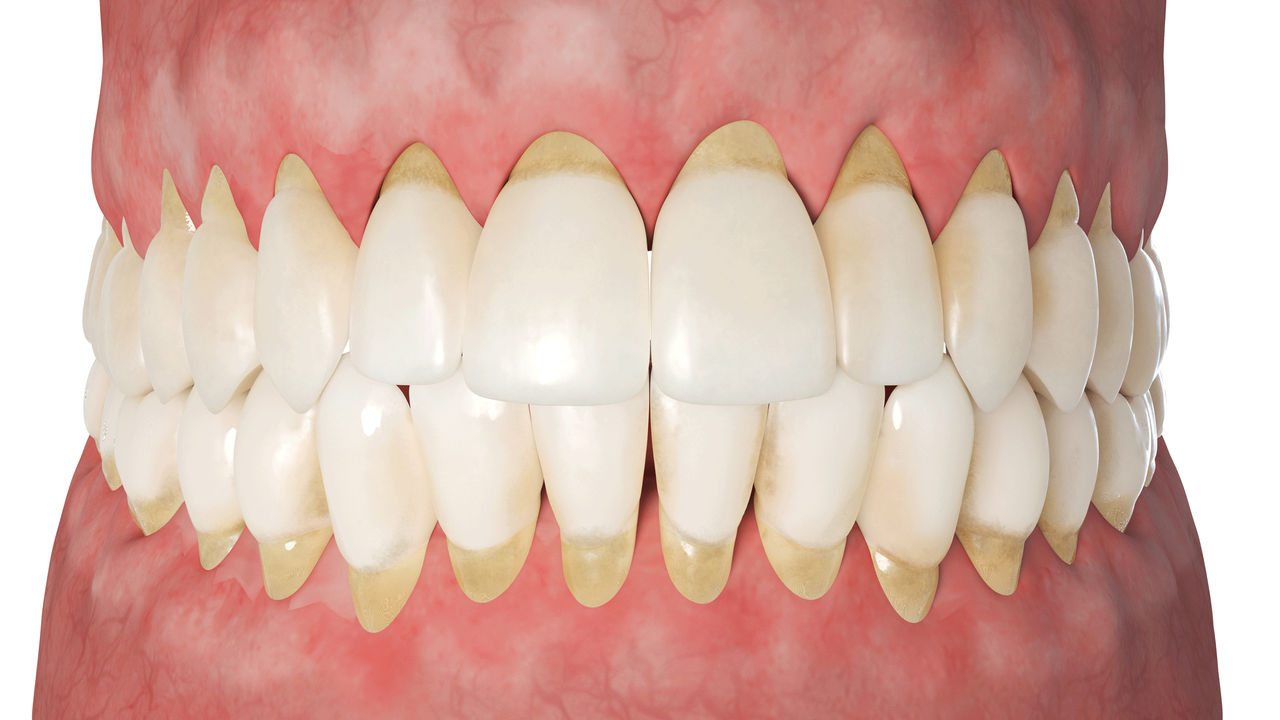What Is Periodontitis?

Do your gums bleed when you brush your teeth? With periodontitis, bacteria that accumulate on your gums can cause inflammation and bleeding and ultimately damage your teeth.
What is periodontitis?
Periodontitis (per-e-o-don-TIE-tis), or periodontal disease, is a serious infection of the gums. If you don’t catch and remove shreds of food that get stuck between your teeth and on your gums, your gums become inflamed. Periodontitis can permanently damage your teeth unless it’s treated early. Cleaning your teeth and gums at least twice a day can save you much trouble.
YOU MIGHT ALSO LIKE: Oral Bacteria Linked to Pancreatic Cancer
What is gingivitis?
Gingivitis is the technical term for the inflammation at the beginning of periodontitis, when your gums bleed. You always have bacteria in your mouth, but a buildup of food deposits on your teeth, called plaque, allows bacteria to overgrow. Mineral deposits, called tartar, develop. Tartar is more difficult to remove and filled with bacteria.
The longer plaque and tartar remain on your teeth, the more damage they can do. Brushing and flossing won’t remove tartar: You need a professional dental cleaning to remove it.
Early and moderate periodontal disease
In the early stages of gum disease, your gums recede. The attachment of the gum to the root of the tooth breaks, creating small pockets between your teeth and gums. The pockets become pools for bacteria.
Your immune system, identifying the bacteria as dangerous, responds with inflammation. But that response backfires. Your gums recede further.
This is the stage when your gums easily bleed. They may look red or purplish, be puffy or swollen, and feel tender when touched. You may also lose a bit of the bone that supports your teeth.
As the gum disease progresses, you’ll have more bleeding and may feel pain. The bacteria in the pockets release toxins that cause further damage. Your teeth may become loose.
What causes periodontitis?
It’s healthy to have hundreds of different types of bacteria, most of them harmless, in your mouth. But they can overgrow, turn into tartar, and stress your immune system, unless you remove food deposits every day.
Other factors that can increase your vulnerability:
- Smoking
- Type 2 diabetes
- Obesity
- Hormonal changes in women (menstruation, pregnancy, or menopause)
- Conditions that weaken your immune system (for example, HIV or leukemia)
- Medication that cuts saliva in your mouth
- Poor nutrition
- Genetics
How is periodontitis diagnosed?
See your dentist regularly so you can have your gums probed, measuring the size of any pockets (it’s painless). Any plaque or tartar can be removed in a cleaning. Dental x-rays provide further information. If you have developed periodontitis, you will be referred to a periodontist.
Non-surgical treatments for early periodontitis
- Scaling — removing tartar and bacteria from surfaces of the tooth and beneath the gum line
- Root planing — smoothing of the root surfaces to prevent further buildup of tartar and bacteria
- Antibiotics — used topically or orally to help control a bacterial infection
Advanced periodontal disease
The connective tissue that holds your teeth in place can begin to fall apart. Chewing may become very painful. You may have bad breath and a foul taste in your mouth and lose teeth. Bacteria can enter your bloodstream through gum tissue and aggravate other vulnerabilities.
If you have advanced periodontitis, dental surgery may be necessary, such as:
- Flap surgery (pocket reduction) to expose the roots in a section of gum tissue for more effective scaling and root planing
- Soft tissue grafts to replace damaged gum tissue
- Bone grafting when bone surrounding a tooth root is destroyed
- Guided tissue regeneration, which allows the regrowth of bone by placing a biocompatible material between your bone and tooth
- Tissue-stimulating proteins, which come in a gel applied to a diseased tooth root to help stimulate healthy growth of bone and tissue
What are the complications of periodontitis?
Periodontitis can be painful, and you can lose teeth. They may migrate within your mouth.
The infection can spread to other parts of your body and strain your immune system. Periodontitis is linked with lupus, mild cognitive impairment, psoriasis, respiratory disease, rheumatoid arthritis, coronary artery disease, and poor blood sugar control in diabetes.
Many psychiatric disorders are linked to periodontitis as well. The severely mentally ill have almost three times the risk of losing all their teeth, compared to the general population.
Think of your dental routine as one of the easiest ways you can protect your overall health and avoid the discomfort and expense of periodontal work later in life.
Updated:
July 25, 2022
Reviewed By:
Janet O’Dell, RN